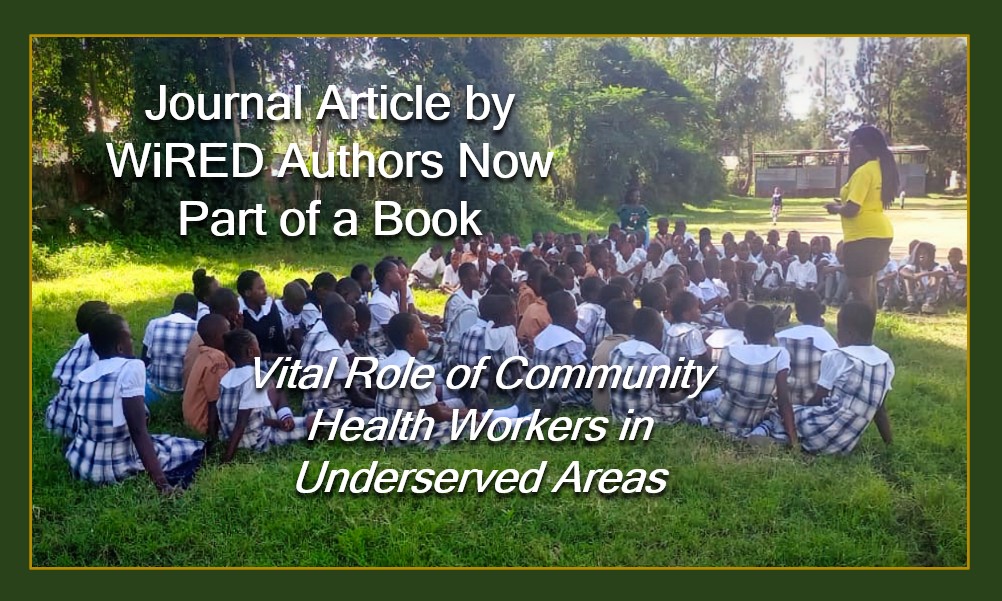By Allison Kozicharow; Edited by Elizabeth Fine
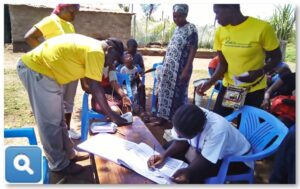 In April 2025 the journal Frontiers in Public Health published a paper co-written by WiRED International Medical Programs Director Maryam Othman, M.D., M.P.H., and WiRED Executive Director Gary Selnow, Ph.D. The article is entitled “Community Health Workers: A Narrative Review of a Curriculum and Training Program for Low-Income Communities Facing Limited Access to Healthcare.”
In April 2025 the journal Frontiers in Public Health published a paper co-written by WiRED International Medical Programs Director Maryam Othman, M.D., M.P.H., and WiRED Executive Director Gary Selnow, Ph.D. The article is entitled “Community Health Workers: A Narrative Review of a Curriculum and Training Program for Low-Income Communities Facing Limited Access to Healthcare.”
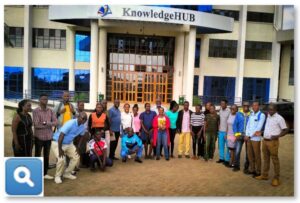 The journal just announced the inclusion of the article as part of a book, Science Diplomacy and Neocolonialism: Lessons from the Field with a View to the Future. The publication features 15 articles and 72 authors.
The journal just announced the inclusion of the article as part of a book, Science Diplomacy and Neocolonialism: Lessons from the Field with a View to the Future. The publication features 15 articles and 72 authors.
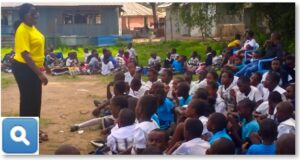 In their article Drs. Othman and Selnow examined WiRED’s community health worker (CHW) training program and assessed its impact through a case study of WiRED’s 20-member CHW team in Kisumu, Kenya (see web story). The authors’ goal was to describe the curriculum and offer the program for easy access in other underserved communities around the world.
In their article Drs. Othman and Selnow examined WiRED’s community health worker (CHW) training program and assessed its impact through a case study of WiRED’s 20-member CHW team in Kisumu, Kenya (see web story). The authors’ goal was to describe the curriculum and offer the program for easy access in other underserved communities around the world.
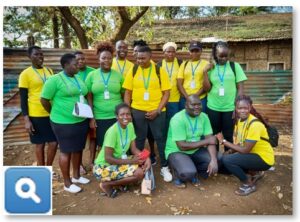 Since April WiRED has ramped up our CHW program and CHW continuing medical education program in response to the global health aid cuts under the present U.S. administration. 2026 will concentrate on accelerating WiRED’s programs as newly trained CHW teams continue to educate and support the health of their communities during this challenging time.
Since April WiRED has ramped up our CHW program and CHW continuing medical education program in response to the global health aid cuts under the present U.S. administration. 2026 will concentrate on accelerating WiRED’s programs as newly trained CHW teams continue to educate and support the health of their communities during this challenging time.
WiRED congratulates Drs. Othman and Selnow on their book publication!
About the Frontiers in Public Health Journal
Frontiers in Public Health was founded in 2007 by Henry Markram and Kamila Markram, neuroscientists from the Swiss federal Institute of Technology in Lausanne, Switzerland. Starting from neuroscience, the journal today “spans hundreds of academic disciplines and is one of the most cited and largest research publishers in the world.” The journal’s mission “is to make science open so that scientists can collaborate better and innovate faster to deliver the solutions that enable healthy lives on a healthy planet.”
The Authors
Dr. Maryam Othman is WiRED’s Director of Medical Education, bringing a wealth of medical and international public health experience. She manages all content for WiRED’s Community Health Training Program and develops the texts for the tutorials and study materials. Currently, Dr. Othman is Chief of Global Health Section in the Department of Population Health Science and Assistant Professor at Western University of Health Science College of Osteopathic Medicine. She received her M.D. from the University of Baghdad, Iraq, and her M.P.H. in global health management from The George Washington University, where she was a Fulbright Scholar. She was the Senior National Medical Officer of the International Organization for Migration Baghdad, Iraq, from July 2003 to January 2006.
Dr. Gary Selnow is WiRED’s Founder and Executive Director. He is Professor Emeritus at San Francisco State University and the author/co-author of seven books. Dr. Selnow was twice a Fulbright Scholar and served on a White House task force. He was a regular commentator on NPR’s Marketplace program and a consultant for NBC television and the National Academy of Sciences. He was awarded the 2004 President’s Medal at San Francisco State University and the UC Berkeley Public Health Award.
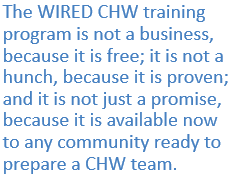
The authors offered the following comments about their article and the value of CHWs:
From Dr. Othman
As someone who was medically trained in a low-resource country, I fully understand the challenges facing our CHWs. Unfortunately, their routine challenges are made much worse by recent government cutbacks in international health. I believe that the WiRED CHW training program fully prepares CHWs to overcome many of the problems now becoming evident with the absence of medicines and vaccines. Local CHWs know the region and the people, and they can be highly creative in identifying solutions. Moreover, they can scale up their outreach efforts and expand their work to nearby communities with cooperative, neighbor-to-neighbor health programs.
From Dr. Selnow
Every community, no matter how small, would welcome having a local doctor on call. However, given the scarcity of doctors in low-resource environments, this is unlikely to become a reality — and the situation is expected to worsen in the years ahead. I have seen firsthand how well-trained CHWs can step in to fill this gap. They can provide essential clinical services, teach prevention, and serve as an active bridge to medical professionals.
Recognizing the potential of CHWs, WiRED developed a rigorous program featuring six weeks of training and an ongoing continuing medical education component. This program equips local CHWs to serve where doctors are scarce; to help the ailing, to educate the vulnerable, to take the sickest patients for higher-level care. WiRED’s training program stands as a testament to the reality that CHWs can elevate health care in isolated and underserved communities. The WIRED CHW training program is not a business, because it is free; it is not a hunch, because it is proven; and it is not just a promise, because it is available now to any community ready to prepare a CHW team.


